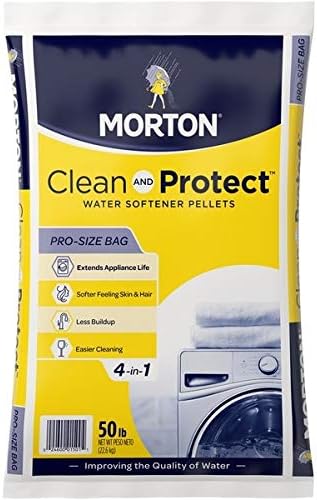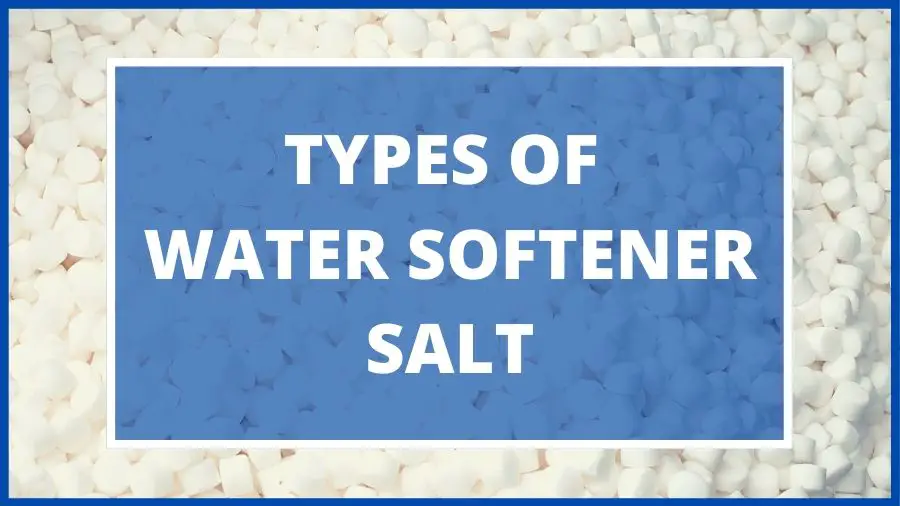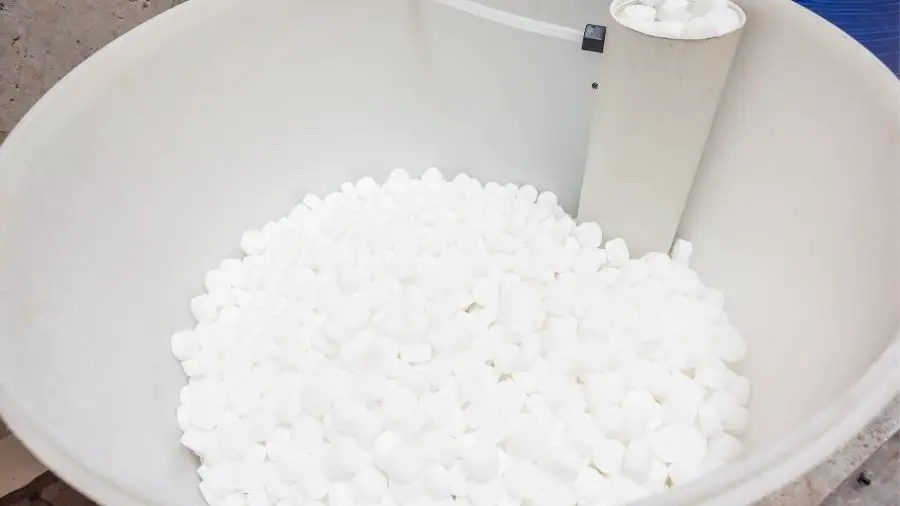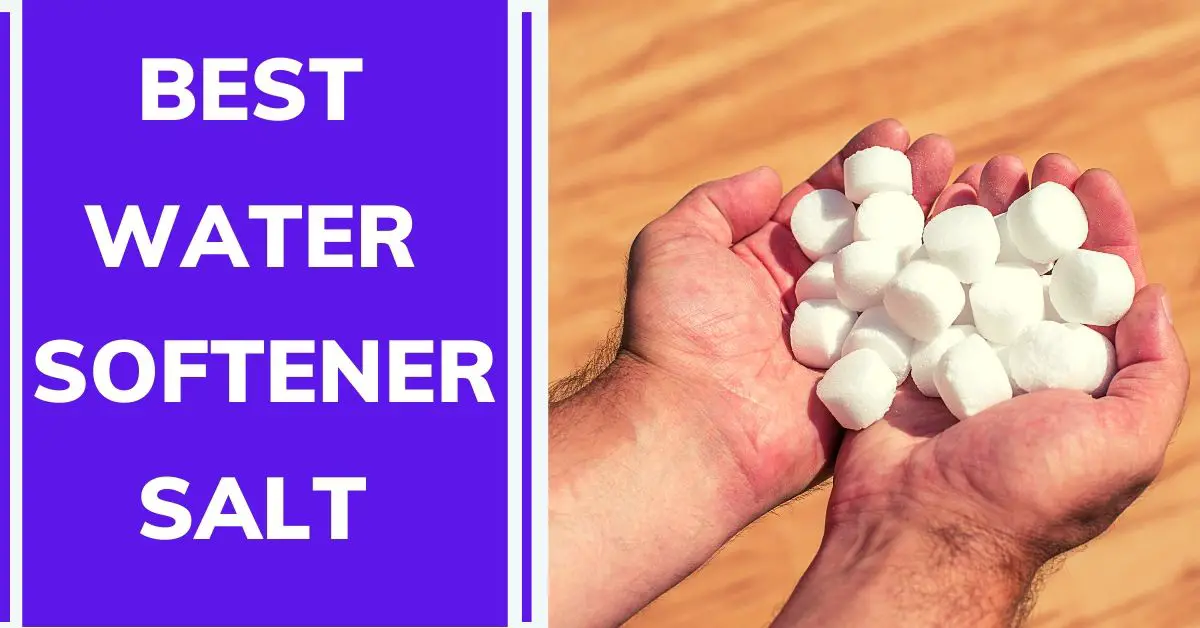Are you looking for best water softener salt for sensitive skin? Then this is the perfect article for you.
There are so many kinds of water softener salts are available in the market to choose from, but not all salts are created equal.
Do you know?
85% of American households have hard water in their water supply, which implies that you’re probably going to be influenced by hard water issues.
In order to help you with your search, we’ve come up with a list of best water softener salts that many users have praised and that we’re sure you’ll like too.
- Best Water Softener Salt For Sensitive Skin
- 1. Morton Clean and Protect II Water Softening Pellets
- 2. Morton Salt Morton F124700000g
- 3. Morton U26624S Natural Crystals
- 4. Cargill Salt 7304 Water Softener Salt
- 5. Diamond Crystal Water Softener Bag
- Why Do You Need Water Softener Salt?
- Buyer’s Guide for Best Water Softener Salt
- Things to Consider Before Buying Water Softener Salt For Sensitive Skin
- Types of Water Softener Salt:
- Sodium Chloride Salt:
- Potassium Chloride Salt:
- Salt Crystals Vs Salt Pellets:
- How Can You Tell If Your Water Softener Needs Salt?
- What Type of Salt Should I Use in My Water Softener?
- How Much Salt Should be in a Water Softener?
- Wrap it up:
- Frequently Asked Questions
Check out our top pick for best water softener salt.

Morton Salt 1501 Clean & Protect
Overall Rating
Best Water Softener Salt For Sensitive Skin
In this section, We have reviewed five best salt products & highlighted some pros and cons of each product. We picked these products based on quality,price & performance.
1. Morton Clean and Protect II Water Softening Pellets
OUR #1 RATED

Overview & Features:
Morton Salt is a very popular brand for table salt. This company is also making salt for water softeners. There is a list of salt products available in the market from this company.
The great thing about this product is that the patented formula avoids any residue & sediments in a brine tank like other rock salts. If you use this salt then you don’t need to clean brine tank frequently. Easy-open tab and hard handle make carrying and pouring more convenient.
This salt is very easy to use, not causing any insoluble residue in the brine tank & increase the life of your water appliances as well.
Pros & Cons
Pros
- Easy to handle & use
- Improves the efficiency of water appliances
- Frequent cleaning of the brine tank is not required
- Manufactured in the US
Cons
- Some customers found this product a little bit pricey
- Heavy bag
2. Morton Salt Morton F124700000g
OUR #2 RATED

Overview & Features:
This is the second product of very popular brand Morton salt. This product is specifically designed to use hard water with high iron water.
It removes 15 times more iron than plain salt!
Better tasting water, fewer rust stains in your bathroom and kitchen, and reduced rust stains on laundry and appliances. It is a crystal type of solar salt.
Most of the people prefer to use this type of solar salt because they are cleaner & efficient than other rock salts available in the market.
Pros & Cons:
Pros
- Easy to handle
- Prevent rust stains in your bathroom and kitchen
- Prevent scale build-up in water heaters and pipes
- Improves the taste of water
Cons
- Little bit pricey product
3. Morton U26624S Natural Crystals
OUR #3 RATED

Overview & Features:
This is third product of very popular brand Morton salt. This high purity & natural salt product. Composed of high purity sodium chloride.
It helps to prevent hard water spots on dishes, household fixtures and appliances. This product can also help to soaps and detergents lather better to work more efficiently for cleaner, brighter and softer laundry.
Pros & Cons:
Pros
- Easy to handle
- High purity natural sodium chloride salt
- Helps soaps and detergents lather better
- Prevent scale build-up in water applinces
Cons
- Some customer reported sulfur smell to water after using this product
- Slightly over priced
4. Cargill Salt 7304 Water Softener Salt
OUR #4 RATED

Overview & Features:
This is another very popular brand after Morton salt. It is a crystal type solar salt. Most of the people prefer to use this type of solar salt because they are more cleaner & efficient than other rock salt available in the market.
Cargill 7304 salt is not creating any issues like bridging,channeling or mushing. You can also use this product for poultry & meat processing.
Pros & Cons:
Pros
- Cleaner & more efficient than rock salt
- Easy to handle
- Poly-bagged & moisture protected packaging
- Fast chemical & ionization process
Cons
- Still little bit pricey product
- Some customer reported not efficient as Morton salt
5. Diamond Crystal Water Softener Bag
OUR #5 RATED

Overview & Features:
This is potassium chloride based salt. Potassium Chloride is a low-sodium alternative to traditional water softener salts.
Made with up to 99.1% pure potassium chloride, these crystals contain low insoluble content to keep your water softening unit running smoothly. Suitable for all kinds of water softeners.
This is best alternative to sodium based salt products.
Pros & Cons
Pros
- Best alternative to sodium based salt
- Easy to handle
- Helps to brighten & whiten laundry
- 99.1% pure potassium chloride
Cons
- Bag doesn’t last compare to sodium based salt bags
Why Do You Need Water Softener Salt?
A water softener works based on the principle of ion exchange. In this water softening process hardness forming calcium & magnesium ions from water replaced with sodium ions which are attached with resin.
The resin is charged with sodium ions. When hard water passes through the water softener, resin release the sodium ions to water & grab the calcium & magnesium ions from hard water & produce soft water.
Over the time ion exchange resin gets exhausted with calcium & magnesium ions. Regeneration is required for resin to bring back to action.
Salt is very essential part of ion exchange resin regeneration process. Without using a salt you can’t regenerate water softener resins.
Salt solution or brine is used to regenerate the resins. Brine solution passes through the water softener which washed away calcium & magnesium irons from resin beads.
It replaces the resin beads with sodium ions. The water used in regeneration is flushed and drained.
Now, the water softener system is reset & ready to generate soft water from hard water.
Buyer’s Guide for Best Water Softener Salt
Getting an ideal water softener salt is beyond a random selection. There are certain things you need to look out for, which will determine if the selected salt would suit your needs.
Things to Consider Before Buying Water Softener Salt For Sensitive Skin
Now you know about the different types of salt, there are some other factors you should consider before buying salt for your water softener. Lets discuss.
Health
This is first & very important factor. For example, some people have high blood pressure or kidney stone issues requires low sodium diet.
In this case they must use potassium chloride salt. On the other hand if sodium is not concern for you then you should use sodium chloride based salt.
Environment
If you’re seriously conscious about the environment then you should pick potassium chloride salt. Sodium based salt leaves sodium rich water which is harmful to environment.
On the other hand potassium is healthy nutrient for plants.
Price
This is the last but also a very important factor to mention. We highly recommend to choose the value for money product.
If you purchase a cheap salt to save some money, it may lead to maintenance of your system.
Types of Water Softener Salt:

Many people confused when it comes to which chemical compound should I choose?
I break down both types of salt in separate sections & discuss each one in detail so that you can pick the best types of compounds that fulfill your requirement.
Sodium Chloride Salt:
There are four types of sodium chloride-based salt available in the market. Let us discuss each of them in detail:
Rock Salt:
Rock salt is mined from the ground like other minerals & contains high impurity level. The use of rock salt will cause debris in the brine tank that requires periodic cleaning of the brine tank. This salt is inexpensive compare to other types of salt.
This salt contains high amounts of impurities & we don’t recommend it.
Solar Salt:
Solar salt is produced by natural evaporation of seawater. It is the highly pure form of salt. This salt is available in the form of crystals or pellets.
Solar salt doesn’t work very well with the hard water that contains a high level of water hardness. This is not the best choice for the people that have very hard water in their home water supply.
Evaporated Salt:
Evaporated salt is the purest form of salt among all types of water softener salts. It comes in the form of a pellet.
It contains very little amount of impurities that’s why it is very expensive to purchase. The main advantage of this salt is that it improves the efficiency of the water softening system.
Block Salt:
Block salt isn’t recommended to use in the water softening system. It sometimes recommended by plumbers for some specific situation. In case you’re using block salt in the water softening system then make sure that the block of the salt is fully submerged in the water.
Potassium Chloride Salt:
Potassium Chloride salt is alternative to Sodium chloride based salt. The main advantage of potassium based salt is that softened water contains no sodium. This can be very helpful for the people who are restricted to sodium based diets.
The disadvantage of potassium based salt are:
- More expensive salt
- Less effective than sodium based salt
In conclusion, We highly recommend sodium based salt pellets as a first choice for your water softener. if you don’t have any restriction to sodium.
Salt Crystals Vs Salt Pellets:
The form of salt has a very large impact on the water treatment softening system then you might think. That’s why it is very important to know about the different forms of salt.
There are mainly two popular forms of salts crystals and pellets are available in the market.
Salt Crystals:
Salt Crystals are produced by the natural evaporation of seawater. Brine ponds are made for the exposure of seawater to sunlight & over time water in the ponds gets concentrated.
Exposure to the sunlight given to the concentrated solution until it becomes a solid mass. This salt is called salt crystals or solar salt.
Solar salt is purer than rock salt. It is 99.6% pure.
Salt crystals are recommended for people having lower than average usage of soft water. If you use salt crystals with high water usage you will soon see a bridging issue in the brine tank.
Salt Pellets:
Salt pellets are produced by a vacuum evaporation method. This method produces almost pure salt 99.9% sodium chloride. It is the purest & most preferred type of salt for softening applications.
This is recommended for moderate to high usage of soft water. The beauty of the salt pellet usage is that you will never need to clean your brine tank over its entire life span.
This salt is the purest form of salt & we highly recommend it.
How Can You Tell If Your Water Softener Needs Salt?
Salt is a very essential part of any water softener system. Without salt, water softener doesn’t work.
Therefore, It is very essential for you to know when to add salt in a water softener.
Salt Level Inside The Tank :
Check the salt level inside the tank by lifting the cover of the brine tank. If the brine tank is half-filled & salt solution looks dry then refill it with salt up to the half level of the tank.
Water Softener Age :
Salt usage also depends on the age of the water softener. For Example, 9-10 years old water softener may consume more salt than a new one. The reason for that is older water softener systems are not very efficient & requires more salt to run the system.
Bridging Issue (Salt Bridge):
A salt bridging or salt bridge condition occurs when the salt level in the brine tank keeps stagnant for a month. In this situation hard crust forms in the brine tank that create empty space between salt & water.
This hard crust works as a barrier between water & salt. Salt can’t be dissolved in water properly so that when low concentration brine enters in the water softener, it washes out the resin.
Due to the low concentration of brine softener resin which is responsible to remove hardness from water can’t work. Water Softening is the ion exchange process.
The bridging issue can be avoided by
- Keep your water softener in low humidity area
- Use an only high-quality salt
- Keep brine tank half-filled with salt
What Type of Salt Should I Use in My Water Softener?
This is the most confusing question among all water softener owners. Please remember one thing, only use sodium or potassium chloride salt that is specifically designed for water softeners.
Don’t use table salt.
Additionally, Insoluble material builds up in the brine tank requires frequent cleaning of the tank. It is highly recommended to use salt pellets with a minimum of 99% of purity.
Some of the salt pellets are available in the are very low quality, contains a high amount of insoluble material & heavy metals. This is responsible for softener malfunctioning.
How Much Salt Should be in a Water Softener?
The short answer is the salt level in your brine tank should be filled around 25% all the time. Salt level should be approx 3-4 inches above the water level.

Do not over fill salt in brine tank
If you found some solid residue also known as bridging in your brine tank then pour hot water over it to remove.
Wrap it up:
There were our five best water softener salt for sensitive skin products that you can choose from. However, if you want nothing but the best, we’d recommend Morton Clean and Protect II Water Softening Pellets. This salt is easy to handle & improves the efficiency of your water appliances.
Moreover, it is also a best water softener salt for sensitive skin.
Frequently Asked Questions
How Much Salt Needed For Water Softener?
This is the most common question we get from the water softener owners. The answer to this question is depends on two things: hardness of water & daily household water requirement.
As per general thumb rule, the household system for 4 family members that are getting water supply with a hardness of 10 gpg requires 40 lb of water softener salt each month.
Can I Mix Different Salts in My Brine Tank?
This situation occurs when you buy water softener salt of different brands. It means at the time of salt top up, you’ll need to mix different types of salts with each other.
Usually, This is not an issue. Water Softener & Water softener salt manufacturers consider this factor that you don’t use a single brand or a single type of salt during the entire lifespan of the water softening system.
Always prefer to use pellets & don’t mix pellets with salt crystals.
Can I Use Food-Grade Salt for Water Softener?
Yes, You can but it is not recommended. Despite the fact that cooking salt is also a sodium salt & has the ability to regenerate the resins but it contains numerous amount of impurities that can damage the water softener.
It is highly recommended that you only purchase the salt which is only designed for water softener & meet all the specifications.
Does softening salt contain chemicals?
Yes, To prevent salt from getting hard during storage & use. Additionally, some types of salts may also contain impurities like metal, rust, etc. These impurities will be picked up at the time of the manufacturing process.
This will not harm your water softening system because it will be flushed out at the time of the regeneration process.
How Much Salt Should be in a Water Softener?
The short answer is the salt level in your brine tank should be filled around 25% all the time. Salt level should be approx 3-4 inches above the water level.
Do not overfill salt in brine tank If you found some solid residue also known as bridging in your brine tank then pour hot water over it to remove.
What If I Don’t Add Salt for Some Time?
If you don’t add salt in your brine tank & not maintain the salt requirement then you will not get soft water. You will get hard water instead.
In this case, replenish the salt level in your brine tank as soon as possible. Please note that you’ll not get immediate effects. You’ll get soft water supply back within 2-3 days in the entire home.
Always keep your brine tank half-filled with salt to avoid the above-mentioned situation. Check the level of brine tank every 2-3 days.
Is it OK to drink softened water?
Yes, if it satisfies the WHO drinking water standard requirements.
